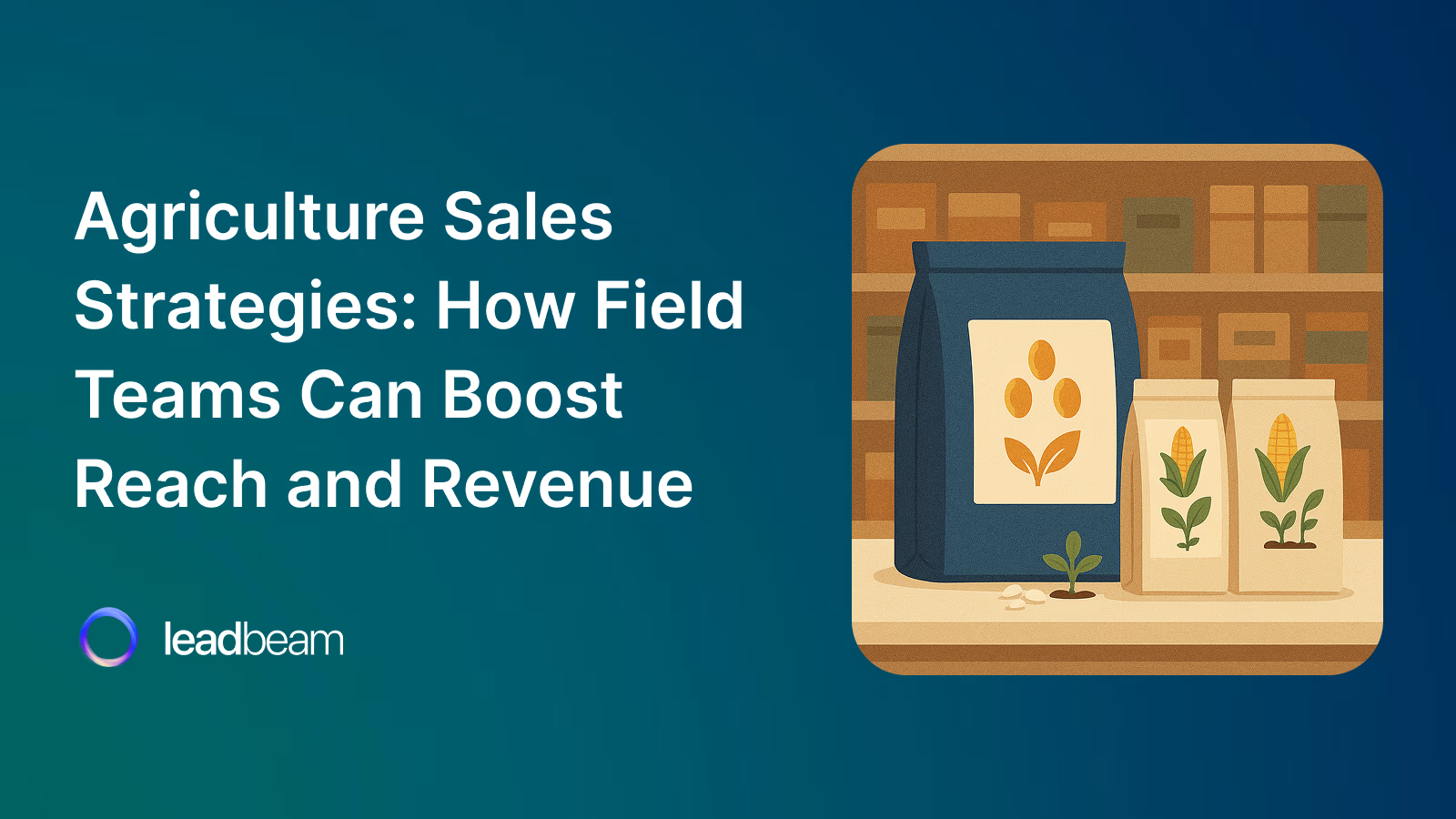
Agriculture sales connects manufacturers of seeds, fertilizers, and crop protection products with the farmers and retailers who depend on them. From North America to Europe to Oceania, this market is built on trust, timing, and strong execution in the field.
Unlike many other industries, agriculture sales typically operates through hybrid models:
This makes field reps critical. They are the link between global input companies, local retailers, and growers, ensuring products reach the right hands at the right time. Without strong field execution, even the best products can fail to gain adoption.
This article explores practical agriculture sales strategies that help field teams build stronger relationships, manage territories more effectively, and drive sustainable growth across diverse agricultural markets.
Agriculture is a cornerstone of the global economy. The US, Canada, and Australia rank among the world's top exporters of grains and oilseeds, with Australia leading wheat exports at 28.8 million tons annually. Europe remains a major dairy producer with 149.4 million metric tons projected for 2025, while also leading in sustainable farming practices and horticulture.
For input providers, every sales season counts. Missing a planting window can mean waiting another year for revenue opportunities. Sales data from India shows this seasonal pattern clearly—tractor sales rose 8.4% to 9.40 lakh units in 2024-25, closely mirroring agricultural growth patterns and farmer investment confidence.
The agriculture sales landscape is becoming increasingly competitive and data-driven. Success requires not just good products, but exceptional execution in the field supported by the right technology and proven agriculture field sales management practices.
Effective agriculture sales strategies begin with understanding that farmers invest in solutions, not just products. Field research shows that successful reps prioritize understanding:
This consultative approach positions reps as trusted advisors rather than product sellers. When reps demonstrate genuine understanding of farming challenges, they build credibility that translates into long-term relationships and measurable sales growth.
For example, reps working in corn-growing regions must understand local soil types, common pest issues, and realistic yield targets. This knowledge enables them to recommend specific hybrid varieties, fertilizer programs, or crop protection strategies that address real farm-level needs and deliver proven ROI.
Agri sales flows through complex distribution networks requiring balanced relationship management. Strong agriculture sales strategies focus simultaneously on:
Research indicates that farmers in many regions rely heavily on their local cooperative or dealer for product recommendations. Building strong relationships with these channel partners can significantly amplify a rep's reach and market influence.
Channel partners require different support than end-users. While farmers need agronomic advice and performance proof, retailers need marketing support, training programs, and favorable terms that help them succeed with their own customer base.
Territory planning and performance measurement are essential for effective agriculture sales. Analysis of field sales productivity shows that reps who plan strategically achieve significantly higher territory coverage and customer satisfaction rates.
Strong agriculture field sales management includes:
Well-managed territories translate directly into more productive farm and retail visits, higher sales velocity, and improved market penetration.
Agri sales relies heavily on proof and tangible results. Field demonstration programs are particularly effective for:
Research shows that well-executed demonstration plots can influence purchasing decisions across multiple seasons and hundreds of farmers. The key is consistent execution—establishing sites early, maintaining them properly throughout growing cycles, and documenting results with quantifiable data.
Different agricultural inputs require specialized agriculture sales strategies based on unique buying patterns, decision timelines, and ROI calculations.
Seed purchases often involve the longest sales cycles and highest customer loyalty. Effective approaches include:
Fertilizer sales require balancing agronomic recommendations with clear economic justification:
Pesticide and herbicide sales demand strong technical knowledge and compliance focus:
Comprehensive agriculture sales strategies often include strategic bundling to increase customer value and deal size. Research shows effective bundles include:
The key is ensuring bundles provide genuine economic value rather than just combining products for sales convenience.
Field sales productivity data shows that teams using specialized agriculture sales software achieve significantly higher performance metrics. Modern solutions provide:
Analysis indicates that field teams using agriculture sales software report measurable improvements in territory coverage, customer satisfaction scores, and overall sales performance compared to traditional approaches.
Leading agriculture companies track specific field sales metrics that correlate with revenue growth:
Regular performance analysis using these KPIs enables continuous territory optimization and ensures sales teams achieve maximum productivity while serving customer needs effectively.
Agri sales presents unique operational challenges that require strategic solutions:
Successful teams overcome these challenges through proactive agriculture field sales management, strong customer relationships, and technology tools that provide flexibility and real-time market insights.
Generic CRM systems typically fail in agriculture because they're designed for office environments rather than field realities. Specialized field sales software for agriculture teams delivers:
The productivity gains from implementing specialized field sales software create measurable competitive advantages in territory management and customer relationship development.
Several verified trends are transforming agriculture sales approaches:
Companies investing in modern agriculture sales strategies and supporting technology infrastructure are best positioned for success in this evolving landscape.
Agriculture sales success requires more than product knowledge—it demands understanding farmer challenges, building trusted partnerships, and executing territories with precision and consistency.
Companies achieving superior results combine proven agri sales strategies with modern field sales software designed for field team productivity. Whether focused on seed sales strategies, fertilizer sales strategies, or agrochemical sales strategies, success comes from having the right processes, tools, and performance measurement systems in place.
Leadbeam’s field sales software provides mobile-first territory management for field teams across industries. Agri sales teams choose Leadbeam for its intuitive interface, lead generation, smart route optimization, automatic CRM updates via voice, photo, or location — and performance analytics that drive higher productivity and stronger customer relationships.
Ready to see measurable improvements in your agriculture sales results?
Request a personalized demo today and see how Leadbeam helps agriculture sales teams drive more visits, close more deals, and scale smarter.
Leadbeam Blog
Discover tips, strategies, and success stories to empower your field sales team and drive results.